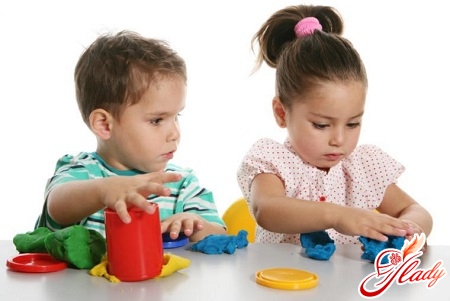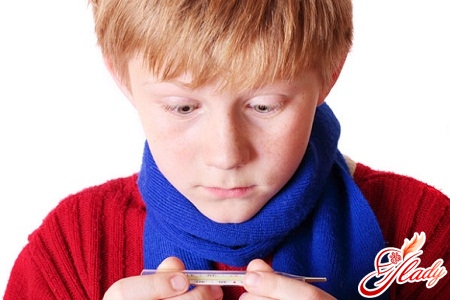 The development of the baby begins with the diapers, and thisпериод имеет особую важность в становлении личности. В раннем возрасте ребенок впитывает любую информацию, как губка и его мозг очень активен. Но нагружать малыша чрезмерной информацией не стоит. С ним надо общаться осторожно и нежно, ведь мозг ребенка в ранний период еще не способен воспринимать знания в большом количестве и все навыки малыша имеют, безусловно-рефлекторный, характер. Младенец еще не может осознанно выполнять даже простые действия. Такие осмысленные движения у него появляются позже, в результате обучения взрослыми. Поэтому игры с ребенком имеют немаловажное значение и помогают ему познавать окружающий мир. Да и родителям будет приятно совместное времяпровождение с малышом. В плане развития ребенка очень полезны пальчиковые игры для малышей. Легкие, простые и веселые они принесут ему большую пользу, развивая мелкую моторику рук и знакомя его с новыми ощущениями. Уже давно признано и то, что развитие рук ребенка, его мышление и речь находятся в тесной взаимосвязи. И вы, наверное, не раз обращали внимание на то, как малыш пытается познавать новое, прикасаясь к нему пальчиками. Именно таким образом он знакомится с понятиями «мягко» и «твердо», «тепло» и «холодно». Поэтому значение пальчиковых игр очень велико для формирования всесторонне развитой личности. Играйте с ребенком как можно чаще, но недолго. Этим вы будете способствовать активации мыслительных процессов, развитию речи и фантазии карапуза. Было подмечено также, что чем лучше развиты кисти у ребенка и активней работают пальчики, тем быстрее он начинает говорить и легко справляется с произношением сложных звуков. Напрашивается логичный вывод о том, что пальчиковые игры для развития речи просто незаменимы. И этому есть объяснение – формирование коры головного мозга зависит от развитости наших конечностей, а именно – руки и пальцев. И как только кисть малыша приобретает гибкость и пластику, у него появляется и словесная речь. На вопрос «для чего нужны пальчиковые игры» легко может ответить любой специалист. Эти простые упражнения для пальцев помогут синхронизировать работу левого и правого полушария, создавая своеобразную перемычку между ними. Левое полушарие отвечает за словесную речь во время игры, а правое – за развитие фантазии и воображения. И если связь между ними крепкая, то нервные импульсы проходят чаще и быстрей, активизируя мышление и внимание ребенка. Пальчиковые игры для малышей – это не ноу-хау. Их существование было известно еще в давние времена у разных народов. В Китае, например, пользуются большой популярностью упражнения с шариками, перекатывание которых помогает улучшить память, укрепить сердечно-сосудистую систему и наладить работу пищеварительного тракта. Они снимают стресс, развивают ловкость и силу кисти. В Японии вместо шариков использовали грецкие орехи, а в России детей обучали таким известным играм, как «Коза рогатая», «Сорока-ворона» и «Ладушки». И на сегодняшний день значение пальчиковых игр настолько велико, что они были взяты на вооружение специалистами. Задавая себе вопрос для чего нужны пальчиковые игры, мы также легко можем на него ответить, наблюдая за развитием своего малыша. Какой радостью светятся его глазки, когда он пытается повторять ваши движения и слушает стишки. Развивая свои пальчики, ребенок стимулирует мышление, а фантазируя вместе с вами – подключает воображение. Поэтому значение, используемых для занятий с малышом пальчиковых игр, особенно велико в раннем младенческом возрасте.
The development of the baby begins with the diapers, and thisпериод имеет особую важность в становлении личности. В раннем возрасте ребенок впитывает любую информацию, как губка и его мозг очень активен. Но нагружать малыша чрезмерной информацией не стоит. С ним надо общаться осторожно и нежно, ведь мозг ребенка в ранний период еще не способен воспринимать знания в большом количестве и все навыки малыша имеют, безусловно-рефлекторный, характер. Младенец еще не может осознанно выполнять даже простые действия. Такие осмысленные движения у него появляются позже, в результате обучения взрослыми. Поэтому игры с ребенком имеют немаловажное значение и помогают ему познавать окружающий мир. Да и родителям будет приятно совместное времяпровождение с малышом. В плане развития ребенка очень полезны пальчиковые игры для малышей. Легкие, простые и веселые они принесут ему большую пользу, развивая мелкую моторику рук и знакомя его с новыми ощущениями. Уже давно признано и то, что развитие рук ребенка, его мышление и речь находятся в тесной взаимосвязи. И вы, наверное, не раз обращали внимание на то, как малыш пытается познавать новое, прикасаясь к нему пальчиками. Именно таким образом он знакомится с понятиями «мягко» и «твердо», «тепло» и «холодно». Поэтому значение пальчиковых игр очень велико для формирования всесторонне развитой личности. Играйте с ребенком как можно чаще, но недолго. Этим вы будете способствовать активации мыслительных процессов, развитию речи и фантазии карапуза. Было подмечено также, что чем лучше развиты кисти у ребенка и активней работают пальчики, тем быстрее он начинает говорить и легко справляется с произношением сложных звуков. Напрашивается логичный вывод о том, что пальчиковые игры для развития речи просто незаменимы. И этому есть объяснение – формирование коры головного мозга зависит от развитости наших конечностей, а именно – руки и пальцев. И как только кисть малыша приобретает гибкость и пластику, у него появляется и словесная речь. На вопрос «для чего нужны пальчиковые игры» легко может ответить любой специалист. Эти простые упражнения для пальцев помогут синхронизировать работу левого и правого полушария, создавая своеобразную перемычку между ними. Левое полушарие отвечает за словесную речь во время игры, а правое – за развитие фантазии и воображения. И если связь между ними крепкая, то нервные импульсы проходят чаще и быстрей, активизируя мышление и внимание ребенка. Пальчиковые игры для малышей – это не ноу-хау. Их существование было известно еще в давние времена у разных народов. В Китае, например, пользуются большой популярностью упражнения с шариками, перекатывание которых помогает улучшить память, укрепить сердечно-сосудистую систему и наладить работу пищеварительного тракта. Они снимают стресс, развивают ловкость и силу кисти. В Японии вместо шариков использовали грецкие орехи, а в России детей обучали таким известным играм, как «Коза рогатая», «Сорока-ворона» и «Ладушки». И на сегодняшний день значение пальчиковых игр настолько велико, что они были взяты на вооружение специалистами. Задавая себе вопрос для чего нужны пальчиковые игры, мы также легко можем на него ответить, наблюдая за развитием своего малыша. Какой радостью светятся его глазки, когда он пытается повторять ваши движения и слушает стишки. Развивая свои пальчики, ребенок стимулирует мышление, а фантазируя вместе с вами – подключает воображение. Поэтому значение, используемых для занятий с малышом пальчиковых игр, особенно велико в раннем младенческом возрасте.
Influence of finger games on the development of preschool children
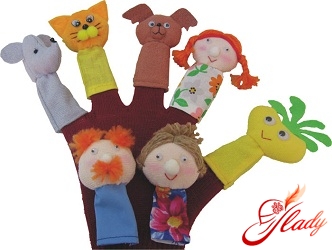 These games are very exciting and contribute tomutual understanding between children and adults. Funny characters of finger games are simple and understandable for kids - a goat and a bunny, rain and sun, a spider and a fly are perceived with delight by children from one and a half years old. They copy all the movements of adults with great enthusiasm and repeat poems after them. Using finger games for preschoolers will teach them to count, introduce the definitions of "up-down", "left - right" and create a sense of self-confidence. There are games in which fingers are bent or act in turn and they are similar to small fairy tales. Children from 4-5 years old can master such finger games and demonstrate them. You can invent characters by dressing the tips of your fingers with paper caps or drawing eyes and a smiling mouth on them. Finger games offered to little children help develop children's creativity, so the child should be praised more often, even if he does not succeed the first time. Children especially like finger games with singing. This combination helps to conduct classes more effectively. For the little ones, a massage of the palms is first used, which includes stroking, bending and unbending the fingers, rubbing. It is done for no more than 3-5 minutes. And for older children, "Goat-Dereza", "Magpie-Crow", "Ladushki" are offered. For example, one of the rhymes sounds like this: "Ladushki-ladushki, where were you? - At grandma's. What did you eat? - Porridge. What did you drink? - Brazhka. We drank and ate - flew home, Sat on our heads." Children from one to two years old best perceive games for which one hand is used. At the age of three, they master finger games for preschoolers with the participation of both hands, and one hand can be a house, and the other a mouse running into it. At the age of four, children play such games with an alternating change of plots in them. And from 5 years and above, finger games for preschoolers are supplemented with various objects that allow more active use of the child's hands and fingers - balls, cubes, pyramids, houses and other toys. For many parents, it is no longer a secret that the mental development of a child and the setting of his speech greatly depend on the development of fine motor skills. Fingers are a rather convenient solution for a baby if he wants to play outside, in kindergarten, at school. Fingers can be used at any time - they can be counted, turned into a bunny, run around the table with them and much more. Exercises and games for children's fingers are a very effective means for developing the correct speech of a child at preschool age.
These games are very exciting and contribute tomutual understanding between children and adults. Funny characters of finger games are simple and understandable for kids - a goat and a bunny, rain and sun, a spider and a fly are perceived with delight by children from one and a half years old. They copy all the movements of adults with great enthusiasm and repeat poems after them. Using finger games for preschoolers will teach them to count, introduce the definitions of "up-down", "left - right" and create a sense of self-confidence. There are games in which fingers are bent or act in turn and they are similar to small fairy tales. Children from 4-5 years old can master such finger games and demonstrate them. You can invent characters by dressing the tips of your fingers with paper caps or drawing eyes and a smiling mouth on them. Finger games offered to little children help develop children's creativity, so the child should be praised more often, even if he does not succeed the first time. Children especially like finger games with singing. This combination helps to conduct classes more effectively. For the little ones, a massage of the palms is first used, which includes stroking, bending and unbending the fingers, rubbing. It is done for no more than 3-5 minutes. And for older children, "Goat-Dereza", "Magpie-Crow", "Ladushki" are offered. For example, one of the rhymes sounds like this: "Ladushki-ladushki, where were you? - At grandma's. What did you eat? - Porridge. What did you drink? - Brazhka. We drank and ate - flew home, Sat on our heads." Children from one to two years old best perceive games for which one hand is used. At the age of three, they master finger games for preschoolers with the participation of both hands, and one hand can be a house, and the other a mouse running into it. At the age of four, children play such games with an alternating change of plots in them. And from 5 years and above, finger games for preschoolers are supplemented with various objects that allow more active use of the child's hands and fingers - balls, cubes, pyramids, houses and other toys. For many parents, it is no longer a secret that the mental development of a child and the setting of his speech greatly depend on the development of fine motor skills. Fingers are a rather convenient solution for a baby if he wants to play outside, in kindergarten, at school. Fingers can be used at any time - they can be counted, turned into a bunny, run around the table with them and much more. Exercises and games for children's fingers are a very effective means for developing the correct speech of a child at preschool age.
Dependence of the development of speech on the use of finger games
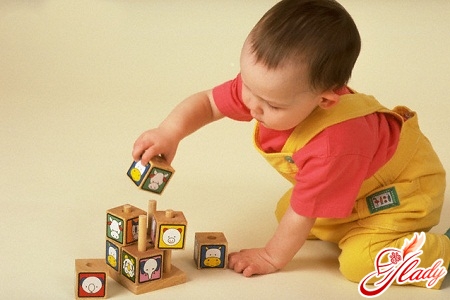 Finger games for speech development bringgreat benefit and joyful communication at the same time. Such exercises, combined with learning texts, stimulate not only speech development, but also spatial thinking, imagination, attention and reaction speed. And most importantly, all texts are presented in poetic form, which is remembered by small children best and easiest. Rhythm and special construction of words have a magical effect on them, calm and comfort. How much the kids like the game depends on how the adult presents it. For little ones, a gentle touch and affectionate intonation of the mother's voice are important. Children aged 3-5 years better perceive facial expressions and clear speech of adults, who should know the proposed poems by heart. Finger games designed for speech development have another wonderful quality - they promote joyful communication between loved ones. During these games, parents usually sit the baby in their arms, stroke him, hug him, giving a lot of positive emotions, which has a beneficial effect on his overall development. By plunging into the fun and exciting world of finger games with your child, you will master a useful and exciting activity, the role of which in the formation of a future personality is difficult to overestimate. Recommendations for preparing for finger games:
Finger games for speech development bringgreat benefit and joyful communication at the same time. Such exercises, combined with learning texts, stimulate not only speech development, but also spatial thinking, imagination, attention and reaction speed. And most importantly, all texts are presented in poetic form, which is remembered by small children best and easiest. Rhythm and special construction of words have a magical effect on them, calm and comfort. How much the kids like the game depends on how the adult presents it. For little ones, a gentle touch and affectionate intonation of the mother's voice are important. Children aged 3-5 years better perceive facial expressions and clear speech of adults, who should know the proposed poems by heart. Finger games designed for speech development have another wonderful quality - they promote joyful communication between loved ones. During these games, parents usually sit the baby in their arms, stroke him, hug him, giving a lot of positive emotions, which has a beneficial effect on his overall development. By plunging into the fun and exciting world of finger games with your child, you will master a useful and exciting activity, the role of which in the formation of a future personality is difficult to overestimate. Recommendations for preparing for finger games:
- Never touch a small child with cold hands. You can rub your palms or warm them on a radiator, under warm water.
- Before you start a new game, introduce the baby to unknown characters on the example of pictures or toys.
- Up to one and a half years finger games with the child spend in the form of passive gymnastics or as a demonstration.
- During the game, use the most expressive facial expressions.
- Try to touch the baby as often as possible with your fingers, ironing or tickling it. This will cause additional positive emotions.
- After learning 2-3 games, after a while, replace them with new ones.
- Tell a fairy tale or poems with an expression, creating pauses in the right places, speaking quietly or louder, depending on the story.
Work on preparing for school is already underwaypreschool institutions. Finger games in kindergarten prepare children to master the skill of writing in the future. Many primary school teachers note that children have difficulties in learning to write, which is a complex skill that involves the coordinated work of the small muscles of the hand and the entire arm. To master writing, there must also be a certain functional maturity of the cerebral cortex. Finger games in kindergarten contribute to the preparation for mastering writing. Educators and parents who pay due attention to the development of hand coordination and use finger games for this purpose help the intellectual development of the child in kindergarten, and also prepare him for mastering the skill of writing at school.
The first time in first class
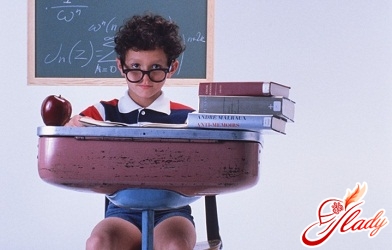 And so the baby goes to school for the first time.Primary school age is the most important period in the life of a little person, because it is at this age that he has a special sensitivity to current events. At school, familiar games do not disappear immediately, but are gradually replaced by training and labor education. They become new and accompany the learning process, make you think and develop your abilities. Finger games for schoolchildren are now used mainly to rest little hands after writing, drawing, etc. For example, children read such a well-known poem "We wrote, we wrote, our fingers are tired", after which they vigorously shake their fingers and rub their palms. Another exercise for primary school age: "Girls and boys are friends in our group, Well, we will make friends with our little fingers. One, two, three, four, five - We have finished counting" After this, the fingers are joined in a lock and touch each other in turn. Then you should lower your hands down and shake your hands. The educational activity in primary school is structured in such a way that there is an incentive to learn about the world around them. Children discover something new and useful every day. But such knowledge does not come by itself. The teacher daily and painstakingly teaches children not only the ability to contemplate, but also to examine, not only to listen, but also to hear. He introduces them to what is primary and what can be transferred to the background, teaches them to conduct a meaningful analysis of surrounding objects. But the development of motor skills at primary school age plays an important role in the formation of the child's abilities. Therefore, finger games for schoolchildren are as necessary as in kindergarten. Although the school does not pay much attention to educational games, imposing on children an approach to any activity from the point of view of adults. The transition from games to serious activities is quite abrupt and should be filled with some transitional forms that prepare for another type of activity. And this is the task of parents and teachers to make such a transition smooth. One of such transitional forms are finger games used for schoolchildren as a means of respite during classes and relaxation. After studying various materials, you can summarize why finger games are needed and how they affect the development of the child. Such exercises are unique for the development of fine motor skills and speech of the child, which are linked together. When learning short poems in finger games, the formation of not only speech is stimulated, but also creative thinking, attention, imagination, reaction speed and emotional expressiveness. Therefore, play with your baby as often as possible, thereby helping him in the development and formation of an intellectual personality. We recommend reading:
And so the baby goes to school for the first time.Primary school age is the most important period in the life of a little person, because it is at this age that he has a special sensitivity to current events. At school, familiar games do not disappear immediately, but are gradually replaced by training and labor education. They become new and accompany the learning process, make you think and develop your abilities. Finger games for schoolchildren are now used mainly to rest little hands after writing, drawing, etc. For example, children read such a well-known poem "We wrote, we wrote, our fingers are tired", after which they vigorously shake their fingers and rub their palms. Another exercise for primary school age: "Girls and boys are friends in our group, Well, we will make friends with our little fingers. One, two, three, four, five - We have finished counting" After this, the fingers are joined in a lock and touch each other in turn. Then you should lower your hands down and shake your hands. The educational activity in primary school is structured in such a way that there is an incentive to learn about the world around them. Children discover something new and useful every day. But such knowledge does not come by itself. The teacher daily and painstakingly teaches children not only the ability to contemplate, but also to examine, not only to listen, but also to hear. He introduces them to what is primary and what can be transferred to the background, teaches them to conduct a meaningful analysis of surrounding objects. But the development of motor skills at primary school age plays an important role in the formation of the child's abilities. Therefore, finger games for schoolchildren are as necessary as in kindergarten. Although the school does not pay much attention to educational games, imposing on children an approach to any activity from the point of view of adults. The transition from games to serious activities is quite abrupt and should be filled with some transitional forms that prepare for another type of activity. And this is the task of parents and teachers to make such a transition smooth. One of such transitional forms are finger games used for schoolchildren as a means of respite during classes and relaxation. After studying various materials, you can summarize why finger games are needed and how they affect the development of the child. Such exercises are unique for the development of fine motor skills and speech of the child, which are linked together. When learning short poems in finger games, the formation of not only speech is stimulated, but also creative thinking, attention, imagination, reaction speed and emotional expressiveness. Therefore, play with your baby as often as possible, thereby helping him in the development and formation of an intellectual personality. We recommend reading:






